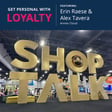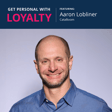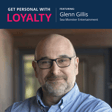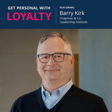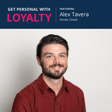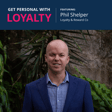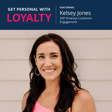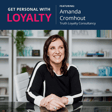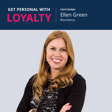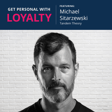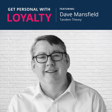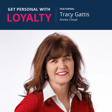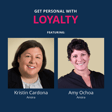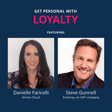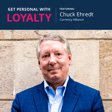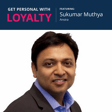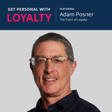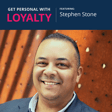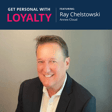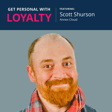Become a Creator today!Start creating today - Share your story with the world!
Start for free
00:00:00
00:00:01

Redefining B2B Profitability with Loyalty (ft. David Slavick)
David provides highly precise and accountable loyalty consulting services to customer-centric omnichannel firms. His combination of strategic vision and technology expertise in the B2B space, as well as experience on the client side, give him a unique perspective on how to B2B enterprises in any industry benefit from an effective loyalty program. In this episode we discuss the ways loyalty drives growth across all B2B markets and how to redefine profitability by looking beyond price incentives and diving into the world of B2B loyalty programs.
Transcript
Introduction to Personalized Customer Experiences
00:00:10
Speaker
Get Personal with Loyalty, where we're discussing using loyalty to deliver personalized, relevant customer experiences. Hello, everybody, and welcome to the latest episode of Get Personal with Loyalty. I'm here today with David Slavik from Ascendant Loyalty. Hi, David. Hi, Erin. Good to see you again. Yeah, it's great to have you back. You're our first repeat. So excited to have you. Thank you.
00:00:37
Speaker
Yeah, that must mean that was a good thing on the first one so everybody can enjoy and this topic is fabulous as well. So I hope everybody will gain some great practical insight from it. Terrific.
David Slavik's Background and Ascendant's Role
00:00:49
Speaker
For those who haven't heard our previous episode, why don't you give us a little bit of your background and tell us about Ascendant.
00:00:56
Speaker
Sure. So Ascendant is a full service advisory consulting firm dedicated in the CRM and loyalty space. So we work across all categories, retail, specialty retail, department stores, hotels, pure play, commerce companies as well.
00:01:14
Speaker
And we do strategic assessments. We evaluate technology. We work very closely with annex cloud and really deliver great value for clients through our consulting methodology, which we call loyalty leaders. I've been in the space for over 25 years, empirically trained starting at Epsilon.
00:01:31
Speaker
My business partner Jay Weinberg has been in the space for 25 years as well, and we have full-time consultants, project managers, analysts as well, and we even have started a global network of agencies across the globe, 40 to 100 people, yet any of those agencies understanding the culture
00:01:51
Speaker
in various areas of the world, in EMEA, in APAC, in the Middle East as well. So, you know, it's really been a great run. The company's been in place for almost five years and just tremendous demand in the space, loss of cookies, commitment to data, customer centricity, all of it. And what we're going to talk about today is really close to my heart as well, because a lot of it has to do with direct marketing.
00:02:17
Speaker
And at one point in time, I was on that side of the desk working at a company called Dart Hanks in the direct marketing areas. So a commitment to data and understanding the customer and building relationships. That's really the foundation of loyalty in many ways. Well, great. Thank you for that. I knew you had.
00:02:36
Speaker
You've been around a long time and had a lot of great brands. I didn't realize you were at Hart Hanks as well. That was the start. I switched out of Ad Agency side at Barkley Evergreen in Kansas City and then went to work at Hart Hanks in Kansas City.
00:02:49
Speaker
And, you know, it was really a great experience just to get at the foundation of everything relative to householding and data quality and personalization and digital print, et cetera. And then I went to work at Frequency Marketing, which was the foundation, ultimately with Alliance Data purchasing them and then combining with Epsilon. So there you go. There's your loyalty, data into loyalty.
00:03:14
Speaker
a great way to go. Well terrific. Well thanks for joining us again
Growth in B2B Loyalty
00:03:18
Speaker
here today. The topic we wanted to chat about is B2B loyalty. So often I think just because we're consumers always our minds go to B2C. I also know that back from my loyalty 360 days we'd have people talking about B2B and
00:03:34
Speaker
and really thinking, oh, well, maybe that's channel or maybe that's employee incentives. And certainly there's all of that that goes on. But what we're seeing now is a huge push from B2B marketers looking to get to know their customers better and are looking to do loyalty. And I guess, how are you seeing? Are you seeing the same thing? Maybe we start there.
00:04:00
Speaker
I've been telling people it's so exciting we're talking about it because when you get these phone calls from folks you know from your side of the desk or you know researchers or otherwise they say where is the high growth area in the loyalty space and why is it going to be you know six billion dollars you know etc where's the growth it's b2b it's fairly well penetrated in retail
00:04:23
Speaker
and specialty retail and e-commerce. It's not that hard to set up a program off of a website, do it well, that's a whole different story. But to set up a basic program and build the business case, you can pretty much do it by just comparing member to non-member, building your financial model and so on. But the big growth area is in B2B, it really is. And so I'm seeing it in a lot of different areas, whether it's in the manufacturing space or it's in
00:04:53
Speaker
one part of the business. I mean, even where you're seeing like a Home Depot or a Lowe's or a Menards, let's say, doing a pro program. Why are they doing a pro program? Because all the profit that's out the backside of the building is that's where all the profit is. OK, so it's it's not the wife or the husband walking in and spending one hundred dollars to handle a project or buying flowers. It's actually the contract.
00:05:22
Speaker
or a company that sells primary equipment. And then that manufacturer of heavy equipment is selling air filters and oil and maintenance out in the field to keep those pieces of machinery compliant, whether it's Caterpillar or Kubota or John Deere, et cetera. So it's an interesting space indeed. What do you see?
Complex B2B Relationships
00:05:50
Speaker
Oh, we're seeing the same thing. I would say about 25% of our customer base is B2B and about 25% of the people we're talking to at any given time is B2B. And it's been really fascinating to me because like the ones that you've talked about, we've certainly seen a lot in construction, home, that kind of that space. Moen is a client of ours. So we think about
00:06:16
Speaker
that. And that one's kind of interesting actually to go down maybe a little rabbit hole here is they look at customers as you have your the person who the items home it's going into. But then there is a designer that influenced the sale and then there's actually the contractor that's putting it in and maybe it's the contractor that actually purchased it. But so how did they get to know and influence each of those three
00:06:46
Speaker
constituents in order to educate them on their products so that they know and be able to get repeat purchases. So it's been, it's a really interesting way to think about it. Yeah, it's, you could say that it's, it's multivariate or it's highly matrixed. And each one of those influencers or end users has different motivations, has a different buying cycle.
00:07:13
Speaker
has different needs relative to specification, has different people calling on them or influencing them. In each case, the chief marketing officer of that company, you know, has to sit there and think about each one of those audiences and then build communications that's custom tailored to each. It's a, that's a challenge. And that's where the direct marketing side of things definitely comes into play.
00:07:40
Speaker
And it's very exciting. And I thought of this overnight. People on our side of the desk or your side of the desk should be living and breathing, going on sales calls with the client team and actually listening to that dialogue. So
00:08:00
Speaker
If you're meeting with a contractor, if you're meeting with a builder, if you're talking to the end customer that's building that custom home, whether it's Moen or Polar or otherwise, you want to hear what that dialogue's all about. What's important to them? How do they talk about product? How do they talk about new product? How do they talk about pricing? How do they talk about what the differences and advantages are of one versus the other? And by the way, what about the designer?
00:08:27
Speaker
Right. If the designer is creating this wonderful, unique space for a shower in a custom home, the designer is also going and thinking about it as well. If you want to see something cool, I know you talked about Moen and I'm familiar with them having lived in Cleveland. Kohler, go up to Kohler, Wisconsin and see their showroom. Have you ever done that? I haven't, but I've heard about it. Oh my God. Go to the American club, Kohler, Wisconsin.
00:08:54
Speaker
And then not too far away from where the resort is, is there showroom and the spaces that the designers have built, they gave them free reign. It's like something out of a movie to see some of these showers and bathrooms, et cetera, and how they're decorated and how they take advantage of the innovation of the Kohler designers and the collaboration that's involved. It's just incredible.
00:09:21
Speaker
That's interesting. So tying that back to a loyalty, they created an experience that they can have people come visit. They probably also use that and video and maybe training and things like that. Yeah.
00:09:39
Speaker
Yeah, they do. And it just it's inspirational. And it's experiential, right? It's not just something that's taken off of a shelf, or the designer meets with you at your house and says, Well, do you want copper? Do you want brass? You know, do you want silver, whatever it is, right? a pewter. That's, that's a nothing, right? This just takes it to a whole nother level, in terms of the inspiration that's associated with it. And so
00:10:07
Speaker
when you're thinking about the B2B aspects and what's most important, it does work back to what the payback is. And that's where I think one of the biggest challenges is in B2B is you're not talking about massive audiences. You're not talking about, oh, when you get the program up to 10 million members, you're going to be seeing something completely different than when you first launched it.
00:10:31
Speaker
you know what does a pilot look like where do you go to do a pilot do you know pick markets where you have really good sales people and high demand and you know ultimately if it's a b2b2c kind of a concept you bring the consumer the end user in.
00:10:49
Speaker
How do you build those pilots to understand what kind of incremental lift? And then how long is it going to take to see incremental lift? Most of the time, and I'm interested when you guys are consulting as well,
00:11:03
Speaker
You got to really just talk about stealing market share. So that's the reason why, again, a Home Depot or a Lowe's will do these contractor programs and they'll build incentives where if your total sales go up by 10%, if your total sales with us go up 20% versus prior year, we're going to give you different pricing and do two-tiered pricing, right?
00:11:25
Speaker
So that that would that you're buying the floorboards that you're buying, you know, what you're using to go and actually build a home and construct it, the roofing, everything else is at a differential pricing. Because I can tell that if you're increasing your total sales, some of it might be pure growth and demand, but some of it might be because you're buying from us and you're not buying from the competition. Yeah, all great points.
Developing B2B Loyalty Programs
00:11:49
Speaker
A couple of thoughts I had in listening to you first, you brought up the pilots and you said where and how.
00:11:56
Speaker
How do you advise people on that. Is it. I've heard different people when we're having conversation some want to go to a market kind of less traveled to see if they could make a boost. Others look at OK where I'm most popular and I have the biggest following. Let me go there because I need to be rewarding those people.
00:12:17
Speaker
might be harder to see a lift in a saturated market. It might be easier to see a lift where there's not as much going on, but if there's not a lot going on, maybe there's a different reason. How do you make that determination? Talking to each other and just sorting it out might be multiple tests. You know, the one where it's a softer market, but you see potential and there's optimization that can be found from it. Maybe you go in there and you find out how high is up.
00:12:45
Speaker
The one where it's more competitive, but you have to differentiate versus the competition because they already have a program in place and you're late to the market or you did have a program in place, but it really wasn't working optimum. And it's more of a program refresh and then build a whole new set of experiences and benefits and service that's associated with it. You're only going to get a small lift, but at least you're not going to lose business.
00:13:11
Speaker
I would say you would do multiple tests if you can. Easy for me to say, harder to manage, but that's your baseline. Then naturally, you need comparative controls. Even if it is a weaker market and it's Birmingham, Alabama, then you got to go and compare that to
00:13:30
Speaker
you know, Sarasota, Florida, or whatever it is, to compare one against the other test versus control. And the same thing in a primary market, if it's Philadelphia, where it's super competitive, then compare that to another major city, a Houston, a Chicago, what have you, to be able to compare. But a lot of it has to do, I'm telling you with the Salesforce, a lot of it has to do with the service organization, maintenance, delivery,
00:13:57
Speaker
all of those components. If there's weaknesses in a lot of those areas, you need to do an audit on that and understand where your strengths and weaknesses are. Because if you just create a program and go, oh, then it's going to be fantastic. But your sales force isn't working effectively. You're not delivering the product. You've got shortfalls in terms of fulfilling on the orders, whatever the case may be.
00:14:21
Speaker
You're just wasting money. You need to make sure that you're buttoned up in terms of your overall logistics and operating model as well. And we on the loyalty side can help to uncover those things by asking the right questions and doing research and talking to people in the field and talking to customers and finding out where the strengths and weaknesses are. But you've got to get your house in order before you do it. You can't throw a loyalty program at a problem like that and think that it's going to fix all of your hills.
00:14:52
Speaker
That's a great point. Yeah, you can't. Yes, you need you need to have good and be efficient and then add loyalty on top as much as I do. Yeah, you're really good at what you do at edX Cloud and so are we at Ascended, but we could only do so much.
00:15:11
Speaker
Right. Right. You've got to make customers happy anyway. Something else you were talking about earlier where you talked about price and based on a particular customer and the amount of business they're bringing in being able to move them up into a tier. And I think when when you think about B2B and B2B marketers are looking at this
00:15:31
Speaker
They may not be looking at loyalty because it's like, okay, well, we already have this structure where we're giving people these discounts and they're moving up. One of the things that we're seeing is that it doesn't have to be just price. And certainly everybody does appreciate price. And I do think it'd be to be oftentimes that needs to be a component, but there's a lot more that can be done just like on a B to C side of things.
00:15:56
Speaker
that you can do different types of incentives. You can create different benefits as well. Is that what you're seeing as well? Is that how you're coaching people or? Yeah, that's true. I think that if you're dealing with individual proprietor companies or you're dealing with customers that have one to 10 employees, but they're very important to you because you're in the automotive parts business and you're delivering parts, right?
00:16:24
Speaker
So folks like Advanced Auto Parts have a pro program. A lot of these guys in the automotive business are taking care of these shops, right? What can you do to help these shops to be more successful? Can you give them software so that they could manage the employee's time sheets and their scheduling? Can you give them
00:16:46
Speaker
software to help them to do a better job of managing their accounting. Can you provide incremental training to make them better at what they do in repairs, in installation? Could you send them to a school or a class, whether it's virtual or physical, and treat them to something like that?
00:17:09
Speaker
So anything that you can do to make that business, to make that enterprise more successful, you're a better partner.
Tailoring Services for B2B
00:17:18
Speaker
And you can customize those things so that that matches up with your business and your goals and what your mission is. Okay. So if your mission is putting out great product and having a excellent safety record, let's say, but it's also to help my end
00:17:36
Speaker
customers, my end buyers on a B2B type of construct, be most successful and see me as a business partner to them, not just a supplier of goods, but that we're in this together, that creates emotional loyalty, which is what we want on the consumer side. The other part of it is that even within an enterprise, you've got
00:18:03
Speaker
The owner of the company that has certain goals and objectives relative to profit and managing the overhead, you have the purchaser or the buyer that may be accessing and getting the goods and securing it and placing the orders. And then you've got the end users of the product that are installing and working with and et cetera. Each of those has different needs
00:18:30
Speaker
And you need to adapt, obviously, the service solution and the value proposition to each one. In many cases, when it comes to the actual reward or the benefit, who does it go to? And so the benefit actually needs to go to all three, but it's a different delivery mechanism. It's a different set of benefits. And that also speaks to how highly matrix it is.
00:18:57
Speaker
That's a really great point too, is that parent-child relationship potentially. In the Moen example, there's these different constituents and they're really not related, but there can also be, and if you're selling into small businesses, there's the business, there's the owner, and then there's the people that are actually making the decisions. And how do you handle that and what do you
00:19:25
Speaker
What does your program structure look like? And actually, do you need to make them opt in for it too? Maybe some companies, it's going to go to the owner or the company, and maybe other companies, they want to give it to their employees that are using it or making the decisions day to day.
00:19:47
Speaker
and do you create a strategy or program that allows for that flexibility? I would think yes, but that adds a lot of complexity too. It does and it can be very intimidating and that's why at the beginning of our chat I said you have to get into the field.
00:20:03
Speaker
You can talk to the client all you want in this space. You actually have to get into the field and talk to the business owner, talk to the head of procurement and who's the specifier. And then you talk to the actual employee that's working with the goods or installing the goods or servicing the equipment
00:20:24
Speaker
and installing the goods as one example to understand what is involved here and why it's important to them or what benefit that they could ultimately. You can't get inside everybody's heads by going and interviewing the chief marketing officer, the chief operating officer, the chief financial officer. It's not going to work. You actually literally have to get into the field and hear it for
00:20:50
Speaker
I'm not talking about a survey. I'm talking about actually being in the field and talking to those folks. Getting that experience. I think on the B2C side, we tend to do research and we don't always dig in there either. Frankly, I think it's probably a best practice for all programs. If you're going to go and embark on this, what's really happening I think is really important to know if you really want to do it well. Yeah, you're not going to be able to do it in a focus group.
00:21:20
Speaker
Like, you know, again, the automotive example is the easiest one or the, you know, office supply companies or what have you or home improvement, et cetera. You're not you're that's not going to happen. They're not going to take the time to go into a focus group to sit down and talk to you. You could do professional interviews that that you could do over the phone and do one on ones. I had a good friend, Bill Moore may rest in peace. And he worked with Sherwin Williams.
00:21:50
Speaker
And what he did is he interviewed contractors and he interviewed painters and he asked them, what's important to you when, when you're buying paint, what are you looking for from a quality standpoint? What are you looking for in terms of ease of accessing the paint? What could help you? Where is your point of frustration? And that actually informed the development of the Dutch boy pale where on the rim that's actually built in is a poor spot.
00:22:20
Speaker
So when you tip it, it's not going all the way across the piece of metal. It actually funnels the paint down and in. Now, isn't that brilliant? So the research, the talk to them was actually to create a differentiation relative to a can of paint. That's wild. But that was actually created out of all of that interview. How cool.
00:22:45
Speaker
Yeah, it's super important for sure. Although when you look at B2B programs and again kind of referencing back to my early loyalty 360 days where there were some early B2B organizations that were sniffing around loyalty and remember them being just really adamant. No, I need to talk to somebody that does B2B. I'm so different.
00:23:08
Speaker
And yes, it is different just as we've discussed. I think one of the biggest things is a lot of times a B2B organization wants the interaction with their
00:23:21
Speaker
customer, not obviously they want transactions, but when you think about the different kinds of interactions that can happen as well, they want those people to be learning about the product. They want them to be, they want to be able to show them tutorials or different information about what's happening. Cause maybe there's a new, we, we work with dentists, we have a dentist program and there's a new device. What is it? How do you use it? And how do you, and so being able to give people
00:23:48
Speaker
points or some kind of value for actually taking the time and watching the video and learning what it's all about is really important. And so I think that that's a fundamental difference between the two. But then when you think about the things like you're talking about, people want the similar things that we're talking about overall as trends. They want a more frictionless
00:24:10
Speaker
experience. They want you to know them. They want you to show me you know me. They want convenience. Any of those people that are contractors that you were talking about, all right, I've got to go to the store. I've got to pick this stuff up. But boy, what if it's all sitting there for me and I just drive up and or somebody just puts it in my truck for me. There's some just amazing amount of value that can be done. And those are the same
00:24:41
Speaker
trends or components that we're seeing in B2C as well? Well, you know, at the end of the day, I think it's true that bringing people on to a consulting project that have some familiarity with multi faceted, highly matrixed organizations,
00:25:03
Speaker
and what the decision criteria is, what the delivery experience might be, auditing and understanding where the problems, issues, and constraints are. All of those aspects, it's a fair comment to say, I need somebody that understands this space. I can't take someone that's always been in the airline business or the hotel business and assume that they can adapt their best practices in one-to-one customer centricity
00:25:33
Speaker
and be able to understand.
00:25:35
Speaker
my particular challenges at Caterpillar or at Advanced Auto Parts or even going direct to consumer in the food and convenience area, health and beauty, and selling direct and then trying to create a one-to-one experience and understanding who that buyer is. So it's a fair point. And you need to say, what is your process and your methodology? How do you go about figuring these things out?
00:26:04
Speaker
Tell me about stories where you've influenced and created incremental lift. How have you brought technology into it? What do you believe as far as analytics? I'm going to show you what my metrics are and what my data is today. What's missing? How am I going to go and measure incrementality or a payback?
00:26:27
Speaker
All of those, how are we going to measure it? All those things, right? Those are all best practices, but you have to prove to me that you can think about it not in the sense of selling a suit to someone on the floor at Macy's and using a credit card, but buying a $5 million or $10 million piece of medical equipment that's used for DNA analysis.
00:26:52
Speaker
Right? That's a completely different construct. Selling into universities with medical equipment versus selling in to labs that are independent labs. Selling into pharmaceutical companies with your product. That's B2B, right? How do you influence those things?
00:27:10
Speaker
You know, it's a fair challenge and that's the way for the client to demand knowing that you're qualified to be able to service their needs. Traditional agencies that do B2B, I would think are certainly to be considered. I actually worked for an agency in Cleveland called Liget Stash Hour and half of the agency was
00:27:36
Speaker
B2B and the other half of the agency was B2C. Liget was B2B, Stashour was B2C. And they brought the two together and so they could service both. And that made a lot of sense based in Cleveland because you have a lot of industrial companies in Cleveland that you can service. There was some really smart people on the B2C side
00:28:01
Speaker
that understood direct marketing, that understood data management, that understood analytics, that understood what multi-layered decision making is all about, that understood how to work with the people in the field to help them to be most effective, to understand how to talk to decision makers and find out what their criteria is. Why are you buying from X and only spending 10% of your total budget with us? And so there is a discipline that's associated with it. There's no question about it.
00:28:33
Speaker
Yeah, that's really interesting. One of the things is we were prepping for this that you, I think, wanted to talk about, too, that I think plays into what you're talking about here is the type of marketer behind these types of programs. Is there a different skill set for B2B versus B2C? They listen to the field, one. Two, they are very process-oriented.
00:29:02
Speaker
more so. Three, they understand what list buys are all about and what an SIC code is. Four, they believe in analytics and insight. Five, they believe in continuing to do ongoing field research to understand customer satisfaction to a much greater extent. Six, they're not necessarily as worried about brand awareness as much as they are product satisfaction. Seven,
00:29:31
Speaker
you know, obviously direct marketing best practices. And, you know, you can build this can go on, there are much more precise and disciplined skill set.
00:29:44
Speaker
than the typical business to consumer marketer that's thinking about social and mobile and website experience and entertainment and partnerships and things along that nature. It's a different skill set. In many ways, they're fun-loving people and they've got a lot of high IQ on that side of the desk, I would say, and they're empirically trained.
Skills for Successful B2B Marketing
00:30:10
Speaker
marketing and direct marketing. That's the profile that I see in working with those individuals, which is a lot of fun because they take it seriously and they're very demanding as well. That's super interesting. I think I was taking for granted that it would be a very similar skill set, but I think everything you brought out is, those are great points. Well said. Yeah. Yeah. I mean, sometimes you're, you know, when you're on the,
00:30:40
Speaker
When I was at American Eagle Outfitters and I was running CRM and Loyalty, the store operations team drove it. It wasn't the merchant team, it was the store operations team because ultimately we got to take care and delight the customer and the customer is always right. So anything that you implement, the associate, they're your first line to get the enrollment, to explain what the program's all about, to do effective training, all those things. That's change management and training.
00:31:09
Speaker
totally into it and you've got thousands of people and you need to communicate how the program is performing.
00:31:15
Speaker
and all of those things. But then you also got to think about the recognition and reward and the redemption and expiration rules and all that kind of stuff. In the B2B side, like we just talked about, sometimes it's like you were saying, convenience, you know, back of house delivery, speed, time is most important, responsiveness as well. Listening, you know, have really good call center experience and the call center reps are empowered to take care of the customer.
00:31:44
Speaker
take care of out of stocks, things along that nature to a much greater extent. And by the way, we haven't even talked about this, but at many times in a B2B environment, you're dealing with dealers and distributors.
00:31:56
Speaker
another component that we haven't even talked about, where do they fall in the total idea? In this dental client example, the manufacturer is doing one thing, but the one who's really calling on the dentist or the orthodontist office, what have you, is the distributor or you've got a middleman that's involved, they need to be part of the equation.
00:32:19
Speaker
There are all sorts of different things. I'm not saying that one is better than the other on the B2B side versus the B2C side in terms of their skill set. But if I'm hiring somebody for B2B, I've got to hear certain skills that have a heavy skew towards those eight things that I just talked about.
00:32:39
Speaker
That's fabulous. I think it's a lot to think about, but those are all fabulous points. There's a whole different level of complexity, which kind of leads me to another question around some of the differences between B2B and B2C is, are there different KPIs typically, or ROI is probably similar. Can I make that?
00:33:02
Speaker
Maybe I shouldn't say that. Maybe I should just ask the question. Are KPIs and ROI models, are they similar or are they different? Are there different things that you're looking at from a B2B perspective? They're always complex, or we try to make them as complex as possible to impress the client. No, I'm just kidding. Market share is the key when it comes to the B2B side.
00:33:25
Speaker
stealing share from the competition is one. Two, greater penetration of your products. Acceptance of new product is also important. In some cases, acceptance of financing with the customer because if they're taking your financing that you're offering because you're buying
00:33:46
Speaker
large pieces of equipment, whether it's mining equipment and your caterpillar, or it's medical equipment, like it's alumina for DNA testing as an example, you know, you want to know that they're they've got the connection to you, even on the financing side, so greater penetration with financing, higher penetration, you're finding out from your distributors, your salespeople that you're beating out the competition, there's bids going on every single day, competitive
00:34:15
Speaker
one versus the other. So are you closing deals? What's your close rate, which is the same thing as conversion rate, whether you're a consumer and you're going to the website and you buy a pair of pants.
00:34:25
Speaker
or you're doing an RFP and you want bids on certain equipment and you submit it, or you're talking to a municipality and they're buying equipment from you. They're buying front end loaders or they're buying construction equipment to build a piece of, you know, a new building, municipal building, whatever the case may be. You want to see that you're winning those bids and that your service and your pricing, et cetera, is competitive.
00:34:50
Speaker
So, it's a drill down and you've got to set up the methodology, obviously, to capture those things. And it's a combination of examining the deal, identifying those particular attributes that are associated with the sale, but I also think post-purchase satisfaction or why you didn't win the deal. What were the reasons why, right?
00:35:13
Speaker
So in the consumer side, you know, you'd survey how satisfying was your website experience, right? And you get those ratings. Or, you know, I went to Culver's and they asked me, you know, how satisfying was your purchase of a burger today or a fish sandwich post-purchase study? But in the B2B side, doing that kind of survey and finding out why did you buy us or why didn't you buy us? Or at the end of the year, how satisfied are you with your participation in the program and how can we improve?
00:35:43
Speaker
So I think a commitment to ongoing research that comes into play to go and validate what you're doing and then allow you to continue to evolve the program over time, I think is important as well. So it is very different.
00:36:00
Speaker
Very different way to look at it. So I appreciate all of the you've shared. This has been super fascinating. It's a whole nother discipline. Right. It is. It's very challenging. But the fact that that's where the high growth is going to come from. I mean, you look at that. What is the U.S. News and World Report puts out America's favorite loyalty programs. Right. Yeah. Yeah.
00:36:23
Speaker
That issue is the most complete BS you've ever seen in your entire life. What's the difference between a 3.75 and a 3.82? Give me a break in terms of start. Who cares? But the bottom line is if you look in particular categories, everybody has a program, right? So now it's all me too and everybody is going and giving out
00:36:45
Speaker
rewards and incremental markdowns and maybe adjusting what their shipping is and what their return policy is and then doing things that are brand right and so on and integrating with their credit card and so on. And there's a lot of sameness and a lack of innovation in the consumer side. Everything we've just talked about in the B2B side is some of the most exciting ways that you can wind up achieving great success because we're talking about big dollars that are associated with
00:37:15
Speaker
a concentration of business in heavy competitive categories or sectors. And whether it's medical equipment or it's auto parts or any of the other categories that we talked about, the demand for expertise in that space is just gonna continue to grow. And here's the question, how many students in college right now are even thinking about this space? None, none.
00:37:45
Speaker
to how are they gonna learn, right? So one of the things that I've done actually is brought case studies on work that our firm has done to colleges where I'm involved with the ANA and the professors are working on campaigns and direct marketing and they say, can you show us a case study in business to business to open up the students eyes to what this discipline is all
Educating on B2B Marketing Opportunities
00:38:11
Speaker
about? What does it combine? It combines statistics,
00:38:15
Speaker
and branding and, you know, personal service and satisfaction. I mean, all the disciplines that they're learning about, you know, hey, you want to work on the Lululemon account? No problem. Try getting a job there. Or work with major manufacturers, work with consumer goods companies, work with Kraft, work with Procter & Gamble, work with Kimberly Clark, work with Colgate-Palmolive. They want to build a relationship with the end buyer
00:38:43
Speaker
Right now, who they're selling through is through the Kroger's and the Albertsons and the Winn-Dixies and all these of the world.
00:38:52
Speaker
There's a big wide open there in terms of the potential for you to go in and influence and build expertise. But, you know, they have, you have to open up their eyes to it. And it's really fun when I get to do these lectures at the University of Illinois, my alma mater or University of Georgia or Rutgers and show them these case studies. And they're like, wow, it's a whole nother world. And now it's kind of fun. Wow. That's really exciting. I didn't know you were doing that. Yeah.
00:39:19
Speaker
Yeah, any kind of a give back that I can do. At one point in time, Aaron, I was thinking I would retire, who knows when, and I would become a prof, right? Because I have my masters and I've been a practitioner for over 25 years, so I qualify, right? And then I found out you get $3,500 for a whole semester of teaching a course.
00:39:44
Speaker
Right. When you retire. That's not going to work. That's not going to work. I am not going to be Donald Sutherland and be a prof anytime soon. So there you go. That's wonderful that you're sharing what you're learning. I agree. I think once you dig into this, you can get really, it's a topic you can get really passionate about. I think that that's why we're in it and we've been in it for so long. And definitely we've hired a number of people recently and none of them have been in the space.
00:40:13
Speaker
And I feel like I know when I've got somebody that's going to stick when they get that
00:40:20
Speaker
we listen in their eye and they're getting really excited about this stuff. And I have a couple of new salespeople that are coming to mind right now as I'm saying this, they're so excited. They're like, wow, you could do this. And then they're starting to talk to clients and prospects and you could just hear the excitement and see the excitement in their face. And it's like, yeah, this is fun. This is good stuff. Yeah. And because we talked about the skillset of the client on that side of the desk,
00:40:50
Speaker
to the extent that you have a process and methodology to draw out all these areas and ask them all the right questions and be able to formulate a plan and then be able to implement it, you become such an important partner
00:41:06
Speaker
to that business. And so that's really exciting that your folks that you're hiring are seeing that potential, but it's really exciting for the clients on that side of the desk to know that we're out there and we're more than happy to help. And I personally am not thinking about what the value of the client is in fee as much as it is to be of help and offer our services to be a great partner to them.
00:41:36
Speaker
That's what's most exciting because in this space, if you set up the right methodology, you can see results sometimes fairly quickly and sometimes it might take about a year. You got to be a little patient too. Very true.
Engaging with Ascendant Loyalty
00:41:51
Speaker
I guess on that note, I think you teed me up really well for as we wrap up here, how do people get a hold of you?
00:41:59
Speaker
Well, I'm on LinkedIn, david.slavic at ascendantloyalty.com and Slavic is S-L-A-V-I-C-K at ascendantloyalty.com. You can call me. My number is in my contact on LinkedIn and you can visit our site and we've got a contact us page and we will respond in less than 24 hours because we're all about being responsive. So that's our pleasure.
00:42:28
Speaker
Thanks, Aaron. This has been fun, as always. Oh, thank you. I always learn a ton and have a ton of fun when I get to talk to you. Thank you so much. Thanks. Take care. Thanks for listening to this episode of Get Personal with Loyalty. Join us next time for more Loyalty Insights. Until then, dare to dream. Let Annex Cloud help make your dreams a reality. Visit annexcloud.com. See you soon.
